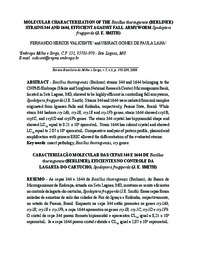Molecular characterization of the Bacillus thuringiensis (BERLINER) strains 344 and 1644, efficient against fall armyworm Spodoptera frugiperda (J. E. SMITH).
Molecular characterization of the Bacillus thuringiensis (BERLINER) strains 344 and 1644, efficient against fall armyworm Spodoptera frugiperda (J. E. SMITH).
Autoria: VALICENTE, F. H.; LANA, U. G. de P.
Resumo: Bacillus thuringiensis (Berliner) strains 344 and 1644 belonging to the CNPMS/Embrapa (Maize and Sorghum National Research Center) Microorganism Bank, located in Sete Lagoas, MG, showed to be highly efficient in controlling fall armyworm, Spodotpera frugiperda (J.E. Smith). Strains 344 and 1644 were isolated from soil samples originated from Iguassu Falls and Rolândia, respectively, Paraná State, Brazil. While strain 344 harbors cry1Ab, cry1B, cry1E and cry1Fb genes, strain 1644 showed cry1B, cry1C, and cry1D and cry1Fb genes. The strain 344 crystal has bipyramidal shape and showed LC50 equal to 8.21 x 106 spores/mL. Strain 1644 has cuboid crystal and showed LC50 equal to 2.07 x 106 spores/mL. Comparative analysis of protein profile, plasmid and amplification with primers ERIC allowed the differentiation of the evaluated strains.
Ano de publicação: 2008
Tipo de publicação: Artigo de periódico
Unidade: Embrapa Milho e Sorgo
Palavras-chave: Bacillus Thuringiensis, Cry genes, insect pathology
Observações
1 - Por padrão são exibidas publicações dos últimos 20 anos. Para encontrar publicações mais antigas, configure o filtro ano de publicação, colocando o ano a partir do qual você deseja encontrar publicações. O filtro está na coluna da esquerda na busca acima.
2 - Para ler algumas publicações da Embrapa (apenas as que estão em formato ePub), é necessário ter, no celular ou computador, um desses softwares gratuitos. Sistemas Android: Google Play Livros; IOS: iBooks; Windows e Linux: software Calibre.
Acesse outras publicações
Acesse a Base de Dados da Pesquisa Agropecuária (BDPA) para consultar o acervo completo das bibliotecas da Embrapa.

